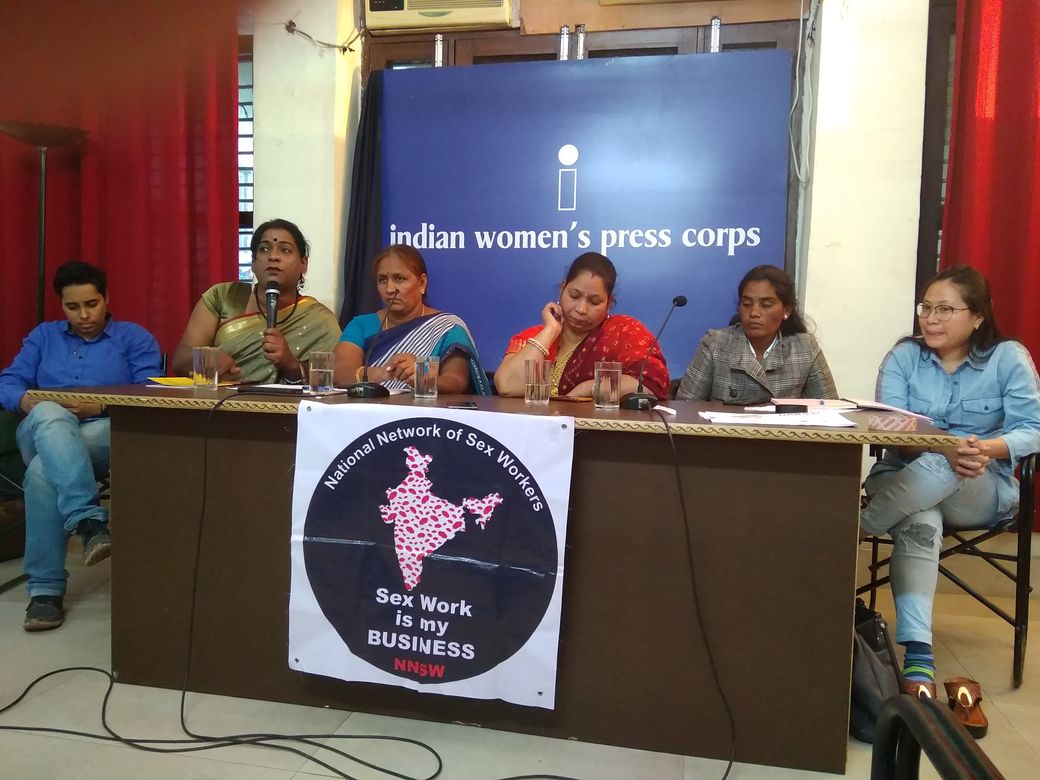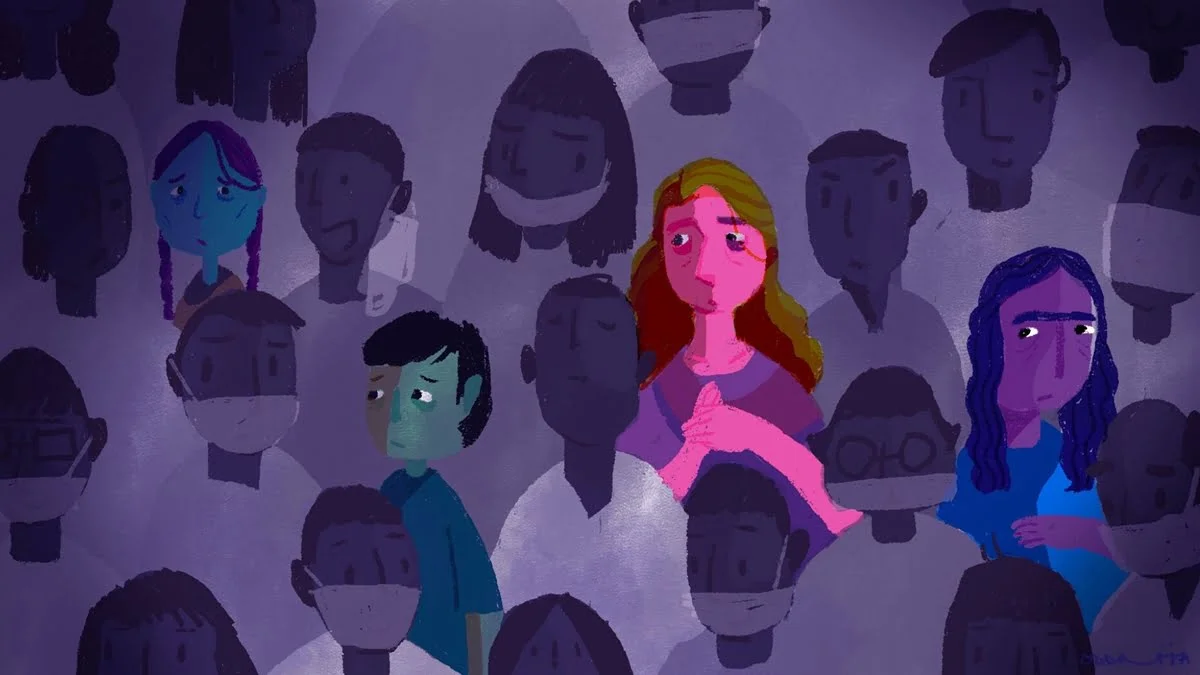A coalition of sex workers unions called a press conference on 6th February 2019 to raise their concerns about the Anti-Trafficking Bill 2018 that has already been passed by the Lok Sabha. Like the Transgender (Protection of Rights) Bill 2018, the Anti-Trafficking Bill too has raised serious criticism from sex workers for its prohibitive policies. “If this bill is passed by the Rajya Sabha,” said Rachana Mudroboyina, a transgender rights activist, “we sex workers will become invisible. We will either be in rehabilitation homes, mental asylums or prisons.”
The Trafficking of Persons (Prevention, Protection and Rehabilitation) Bill 2018 that aims to combat illegal human trafficking, seeks to be a comprehensive bill that not only criminalises trafficking, but also attempts prevention and rehabilitation of victims of trafficking using a raid-rescue-rehabilitate model.
However, the Bill did not take into consideration the lived experiences, concerns and criticisms of the actual stakeholders – like sex workers and the transgender community – leading to several draconian provisions in it. Most importantly, the Bill conflates voluntary sex work with sex trafficking, putting the lives and livelihoods of many sex workers at risk. Despite the Ministry of Women and Child Development clarifying that the Bill does not apply to voluntary sex workers, this important distinction is missing from the Bill itself.
The raid-rescue-rehabilitate model in the Bill sanctions raids in brothels, where sex workers will be ‘rescued’ and then placed in rehabilitation homes, while clients and brothel owners are criminalised. With national news of women and children being sexually abused in State protection homes, the institutionalised rehabilitative model has proven to be a failure. Further, sex workers are shouting themselves hoarse that most of these raids and so-called rescues happen on those working of their own volition, but nobody seems to be listening.
The Bill conflates voluntary sex work with sex trafficking, putting the lives and livelihoods of many sex workers at risk.
A study conducted by several sex workers groups reviewed 243 documented case of rescue and rehabilitation done between 2005 and 2018. Of these 243 women, 193 of them were voluntary sex workers. Amongst the remaining 50 women, 27 were women who had been trafficked into sex work, but now continued working in the profession of their own volition. However, despite so many women claiming that they did not want to be ‘rescued’ or rehabilitated, they were forcibly put into rehabilitation homes, away from their families and without any prospects of earning, effectively ruining their lives. Sex workers demand that the authorities must seek the consent of those being rescued. However, this seems to be a pipe dream.
These rehabilitation homes operate under atrocious conditions – many survivors spoke of finding insects in the food, leading to severe vomiting – and allow no contact with the outside world. “It is worse than a prison,” says Devi of National Network of Sex Workers (NNSW), “because in prison at least you have the rights to see your family or loved ones. Here, it is prohibited, ostensibly for protection.” There is no healthcare or support, especially for those that are HIV positive and require antiretroviral therapy (ART).
Testimony collected from a survivor who was forcibly trapped in a rehabilitation home reads: “After they took me there, for three months they showed me what hell was. I had no phone to call, and I wasn’t allowed to meet anyone… They didn’t even let me talk to my children… They told us that you won’t be able to escape except as a dead body… They came home and told my husband that [your wife] does this kind of work [sex work]. We rent out a few rooms in our house to others. They told all of those people [tenants] that I am a whore. Now I can’t show my face to anyone. If I’m walking down the street and talking to someone, people will say, “She is a whore. Why are you talking to her?” So you took away all my respect in the society? We do sex work secretly, but now you have taken away my respect.” (Edited for clarity.)
Despite so many women claiming that they did not want to be ‘rescued’ or rehabilitated, they were forcibly put into rehabilitation homes.
The Anti-Trafficking Bill demands that those trapped in rehabilitation homes be given training in alternate vocations. “I am 40 years old,” says Kusum, the President of the All India Network of Sex Workers (AINSW), “Are you going to teach me how to sew and make clothes at this age? Why can I not earn my livelihood the way I choose?”
Further, the Anti-Trafficking Bill accords police the right to rescue and rehabilitate any person from any place. This excessive power granted to the police, who are already known for their instances of brutality and harassment of transgender people and sex workers, is dangerous. One cannot forget the story of Tara, the trans woman and activist who was found burned outside a police station in Chennai in 2016.
The Bill has added repercussions for the hijra community, many of whom are traditionally engaged in sex work and begging, and has been seen as another fatal piece of legislation, along with the Transgender Rights Bill, that actively targets and harms the transgender community. Under the Transgender Rights Bill, begging was criminalised with a maximum punishment of 6 months to 2 years. Under the Trafficking Bill, organised begging, which is considered a form of ‘aggravated trafficking’ is punishable with 10 years in prison.
Also read: Why The Trans Bill And The Anti-Trafficking Bill of 2018 Reek Of Transmisogyny
Rachana Mudroboyina states, “The very definition of trafficking in the bill is clumsy and ambiguous. Anyone can be guilty or anyone can be deemed a victim. To explain, imagine the scenario where 2 sex workers are caught in a raid. Often sex workers work in pairs to ensure their safety. In a raid, the police, under the new Bill, can deem one of them as a victim while the other is made the trafficker. The police decide on a whim. There is no proper criteria. This is so problematic.”
The hijra community operates on a guru-chela system, where older community members guide and mentor younger entrants and show them the tricks of the trade. Under the Bill, this would be construed as ‘organised begging’ or ‘trafficked sex work’. The hijra community is a safe haven for many transgender people who have escaped a life of ostracisation and violence in their birth families. “The Trafficking Bill criminalises our guru-chela system by deeming the places we feel the most safe – our guru’s homes – as sites of trafficking and criminalising our gurus,” says Rachana.
“Only we know what our lives our like – shouldn’t we be the ones consulted in the creation of these laws?”
The Bill also criminalises the forcible intake of sex reassignment hormones, ostensibly to combat organised begging. However, this also seems like a direct attack on the transgender community, many of whom seek out elders’ advice on where and how to undergo hormone therapy, a gender-affirming procedure that allows trans people to feel more comfortable with their bodies. This process could be construed as a punishable offence under the Bill.
With a State that is doing nothing to ensure alternative livelihoods for the transgender community and ignoring demands to institute affirmative action policies for them, and simultaneously cracking down on traditional forms of livelihood such as sex work and begging, where does this leave them?
Also read: How The Transgender Rights Bill Only Makes My Life More Difficult
The Anti-Trafficking Bill has ignored the demands of the very communities that are affected by it. “Policymakers are oblivious to the real lives of sex workers,” says Ayesha of NNSW. “Have they ever spoken to sex workers on equal terms? Only we know what our lives our like – shouldn’t we be the ones consulted in the creation of these laws?”
Sex workers’ demands to redraft the Trafficking Bill have been pointedly ignored by governmental bodies while it is being tabled at the Rajya Sabha as we speak. Sex worker unions have worked relentlessly to prevent and reduce trafficking within their networks. Despite their work on this front, they have not only been disregarded but also actively targeted by this legislation.
Voluntary sex work is not a crime. However, if the Anti-Trafficking Bill is passed, it will put the livelihoods of all sex workers in danger, and effectively turn them into criminals in the eyes of the State. “We are women too,” says Devi of NNSW. “Do our rights not matter?”
Featured Image Credit: Esthappen of Human Rights Law Network (HRLN)
About the author(s)
Asmita is a Freelance Communications Consultant, and specialises in leading digital advocacy campaigns for social and gender justice issues. When not using social media for work, she uses social media for fun (and a healthy dash of existential despair).





What can be done about it?